For me, this year
of reading is forever captured by the words of our literary genius Toni
Morrison. Upon hearing of her death, I clung to her now famous quote: “We
die. That may be the meaning of life. But we do language. That may be the
measure of our lives.”
And then I did what I’m sure millions of other readers did: pulled a Morrison classic from the bookshelf—for me it was Sula—and devoured it anew, hungry for the language that only she could do. That slim perfect novel entered my life at a critical moment, when I was searching for a way to understand what I might uniquely say, as a young black woman writer. Sula, in its astonishing portrayal of a black woman like none we’d seen before, liberated my understanding of what was possible.
Weeks ago, at the Brooklyn Public Library, I participated in a continuous reading of Beloved for ‘Til Victory Is Won, a teach-in examining freedom movements from the Middle Passage to Black Lives Matter. Reciting Morrison’s work out loud reminded me of its power and urgency and beauty, because sometimes we must be reminded of what we already know to be true. After that experience, I felt compelled to listen to Beloved on audiobook, to remain awash in the language, this time gifted to me in Morrison’s own arresting voice.
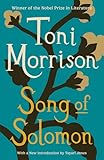 During Morrison’s memorial service at the Cathedral of St. John the Divine, Oprah Winfrey chose as part of her tribute to read a favorite passage from Song of Solomon. (“If I got a home, you got one too…Grab this land! Take it, hold it, my brothers, make it, my brothers, shake it, squeeze it, turn it, twist it, beat it, kick it, kiss it, whip it, stomp it, dig it, plow it, seed it, reap it, rent it, buy it, sell it, own it, build it, multiply it, and pass it on – can you hear me? Pass it on!”). Given her masterful delivery, Oprah reminded us all of the singular and stunning gut-punch of Morrison’s writing. Again, it sent me back to the text, and I went home and re-read Song of Solomon, consuming its pages the way you do a favorite meal cooked by a favorite aunt, one you haven’t eaten in years, yet brings back with each mouthful a deep sense memory. It had been decades since I first read each of those iconic novels; I now understood I’d been bereft without knowing it, had missed the intimacy I once had with those characters and that narrator, the way you realize how much you’ve missed a dear friend only when you actually see her again.
During Morrison’s memorial service at the Cathedral of St. John the Divine, Oprah Winfrey chose as part of her tribute to read a favorite passage from Song of Solomon. (“If I got a home, you got one too…Grab this land! Take it, hold it, my brothers, make it, my brothers, shake it, squeeze it, turn it, twist it, beat it, kick it, kiss it, whip it, stomp it, dig it, plow it, seed it, reap it, rent it, buy it, sell it, own it, build it, multiply it, and pass it on – can you hear me? Pass it on!”). Given her masterful delivery, Oprah reminded us all of the singular and stunning gut-punch of Morrison’s writing. Again, it sent me back to the text, and I went home and re-read Song of Solomon, consuming its pages the way you do a favorite meal cooked by a favorite aunt, one you haven’t eaten in years, yet brings back with each mouthful a deep sense memory. It had been decades since I first read each of those iconic novels; I now understood I’d been bereft without knowing it, had missed the intimacy I once had with those characters and that narrator, the way you realize how much you’ve missed a dear friend only when you actually see her again.
 Before the world shifted on August 5, I was busily reading newly released books while traveling on book tour for my own memoir that came out this year, The World According to Fannie Davis. I love reading while I travel, as there’s so many undisturbed snatches of time that I don’t manage to get at home: waiting at airport gates, flying on planes for hours, resting in hotel rooms before events… In those cherished moments, I read five original and compelling memoirs.
Before the world shifted on August 5, I was busily reading newly released books while traveling on book tour for my own memoir that came out this year, The World According to Fannie Davis. I love reading while I travel, as there’s so many undisturbed snatches of time that I don’t manage to get at home: waiting at airport gates, flying on planes for hours, resting in hotel rooms before events… In those cherished moments, I read five original and compelling memoirs.

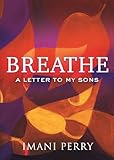

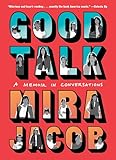
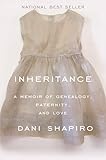 Sarah M. Broom’s National Book Award-winning The Yellow House has some of the most tactile and redolent writing I’ve ever read, is beautiful in so many ways. And it is, among other things, a breathtaking story of Broom’s own quest for both nest and adventure. Imani Perry’s Breathe was for me, as the mother of a 20-year-old black son, both an excruciating and exhilarating experience. That’s how apt and searing and moving is this love letter of a book that Perry writes to her own two African-American sons. Claudia E. Hernandez’s Knitting the Fog, winner of the Louise Meriwether First Book Prize (full disclosure: I was a judge), is a lyrically fresh account of her life as a Guatemalan immigrant, and a story we simply haven’t seen before, not like this. Good Talk, Mira Jacob’s illustrated conversations with her son about race, manages to be both visually inviting and a captivating read, thanks to both her candor and craft. The book is so fantastic, it ups the ante for what graphic memoir can be. Serial memoirist Dani Shapiro’s Inheritance moved me for its naked honesty and deft rendering of a huge family secret, that her beloved Jewish father was not her biological father. As I’ve written my own story of a family secret, I appreciated how Shapiro shared her personal story all the while examining larger cultural implications of that revelation.
Sarah M. Broom’s National Book Award-winning The Yellow House has some of the most tactile and redolent writing I’ve ever read, is beautiful in so many ways. And it is, among other things, a breathtaking story of Broom’s own quest for both nest and adventure. Imani Perry’s Breathe was for me, as the mother of a 20-year-old black son, both an excruciating and exhilarating experience. That’s how apt and searing and moving is this love letter of a book that Perry writes to her own two African-American sons. Claudia E. Hernandez’s Knitting the Fog, winner of the Louise Meriwether First Book Prize (full disclosure: I was a judge), is a lyrically fresh account of her life as a Guatemalan immigrant, and a story we simply haven’t seen before, not like this. Good Talk, Mira Jacob’s illustrated conversations with her son about race, manages to be both visually inviting and a captivating read, thanks to both her candor and craft. The book is so fantastic, it ups the ante for what graphic memoir can be. Serial memoirist Dani Shapiro’s Inheritance moved me for its naked honesty and deft rendering of a huge family secret, that her beloved Jewish father was not her biological father. As I’ve written my own story of a family secret, I appreciated how Shapiro shared her personal story all the while examining larger cultural implications of that revelation.
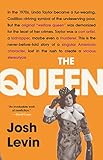 Speaking of cultural implications, I crave stories about black women’s lives that situate them within historical context, which is still so often a rarity. That’s why I was intrigued by Josh Levin’s book about the original “welfare queen” demonized by the media and politicians in the ’70s and ’80s. The Queen is a rich character-study of a complicated black woman that Levin rescues from simplistic stereotyping. It’s also an apt study of the ways black women have been demonized in society; the entire time I was reading its exhaustively researched pages, I kept saying to myself both “Of course!” and “Who knew?”
Speaking of cultural implications, I crave stories about black women’s lives that situate them within historical context, which is still so often a rarity. That’s why I was intrigued by Josh Levin’s book about the original “welfare queen” demonized by the media and politicians in the ’70s and ’80s. The Queen is a rich character-study of a complicated black woman that Levin rescues from simplistic stereotyping. It’s also an apt study of the ways black women have been demonized in society; the entire time I was reading its exhaustively researched pages, I kept saying to myself both “Of course!” and “Who knew?”

 As palate cleansers, I also read two refreshing narratives that took me away from my usual choice of genres. The first is the fun thriller My Sister, the Serial Killer by Oyinkan Braithwaite. Set in Nigeria, it’s so sly and charming that I turned the pages greedily and couldn’t stop smiling. In stark contrast, DaMaris B. Hill’s A Bound Woman Is a Dangerous Thing is a “narrative-in-verse” bearing witness to incarcerated black women across American history. That description does not do justice to the imaginative, sweeping account that Hill renders of black women she reclaims from history—some we’ve heard of, many we haven’t—who were bound in myriad ways, having lost their freedom at the hands of America’s cruelty. That she does so vis-à-vis tribute poems to each woman is a marvel. It’s a heart-wrenching read, but also a soul-stirring one.
As palate cleansers, I also read two refreshing narratives that took me away from my usual choice of genres. The first is the fun thriller My Sister, the Serial Killer by Oyinkan Braithwaite. Set in Nigeria, it’s so sly and charming that I turned the pages greedily and couldn’t stop smiling. In stark contrast, DaMaris B. Hill’s A Bound Woman Is a Dangerous Thing is a “narrative-in-verse” bearing witness to incarcerated black women across American history. That description does not do justice to the imaginative, sweeping account that Hill renders of black women she reclaims from history—some we’ve heard of, many we haven’t—who were bound in myriad ways, having lost their freedom at the hands of America’s cruelty. That she does so vis-à-vis tribute poems to each woman is a marvel. It’s a heart-wrenching read, but also a soul-stirring one.
 Speaking again of Oprah, I recently re-watched her riveting performance in HBO’s The Immortal Life of Henrietta Lacks, as I begin to think about a film adaptation of my own mother’s story. This led me back to the source, Rebecca Skloot’s book of the same name, which remains an astonishing story of two women—Lacks herself, who’d been all but lost to history despite her own cells’ seismic contribution to science, and her daughter Deborah whose mission in life was to right that wrong. It’s a powerful corrective.
Speaking again of Oprah, I recently re-watched her riveting performance in HBO’s The Immortal Life of Henrietta Lacks, as I begin to think about a film adaptation of my own mother’s story. This led me back to the source, Rebecca Skloot’s book of the same name, which remains an astonishing story of two women—Lacks herself, who’d been all but lost to history despite her own cells’ seismic contribution to science, and her daughter Deborah whose mission in life was to right that wrong. It’s a powerful corrective.
I see clearly the theme that has emerged from my reading list this year: women’s lives revealed, reclaimed, reimagined. Feels right. As does ending with our beloved Toni Morrison’s adage:
Books are a form of political action. Books are knowledge. Books are reflection. Books change your mind.
More from A Year in Reading 2019
Do you love Year in Reading and the amazing books and arts content that The Millions produces year round? We are asking readers for support to ensure that The Millions can stay vibrant for years to come. Please click here to learn about several simple ways you can support The Millions now.
Don’t miss: A Year in Reading 2018, 2017, 2016, 2015, 2014, 2013, 2012, 2011, 2010, 2009, 2008, 2007, 2006, 2005
The post A Year in Reading: Bridgett M. Davis appeared first on The Millions.
Source : A Year in Reading: Bridgett M. Davis










